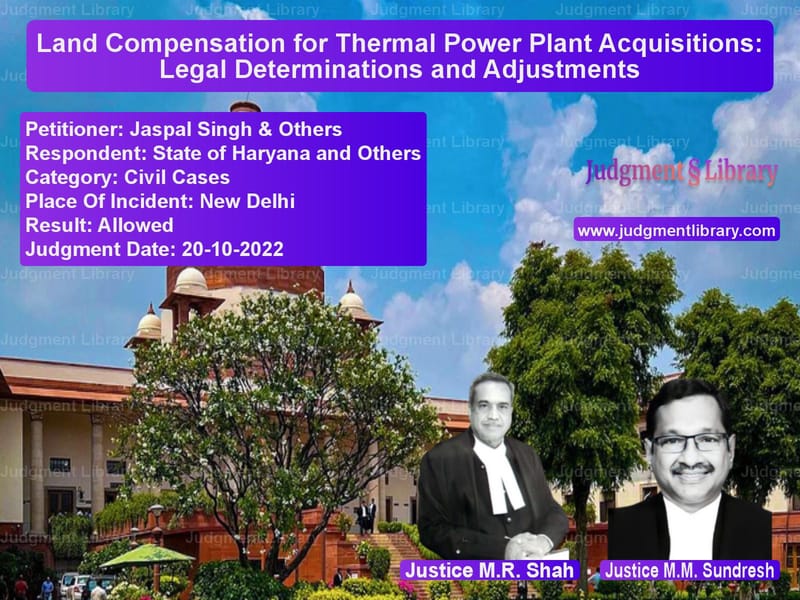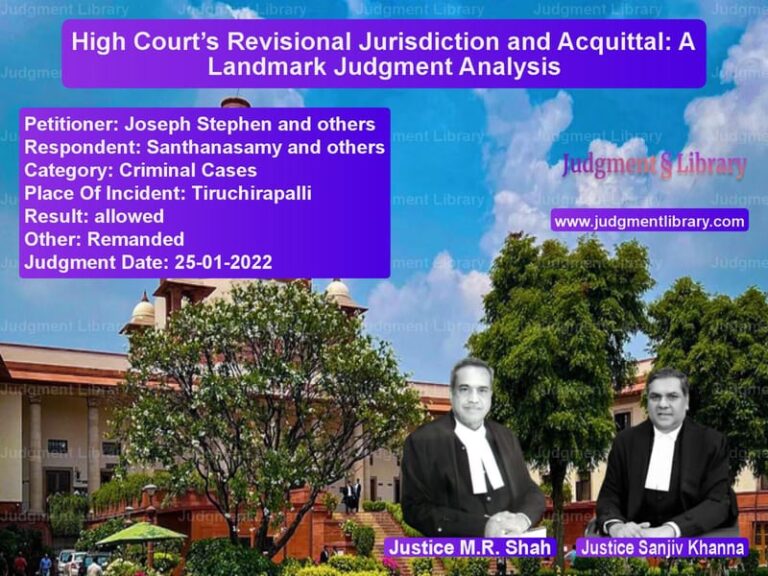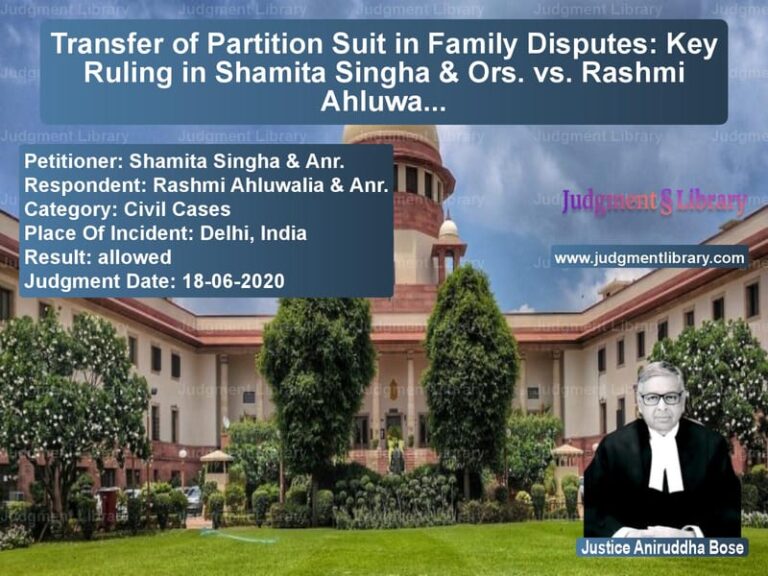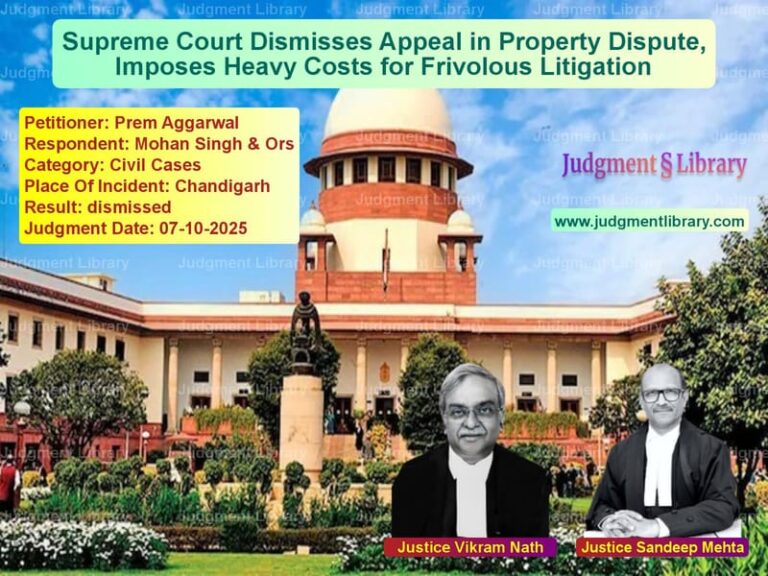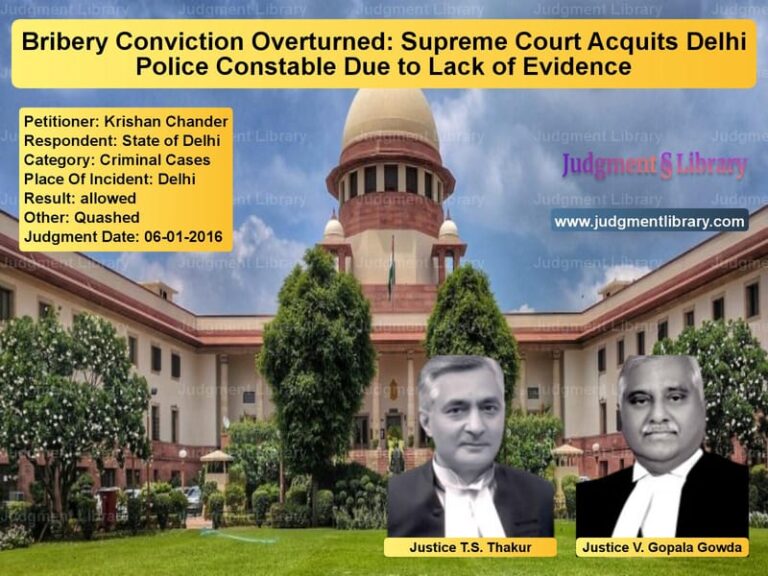Land Compensation for Thermal Power Plant Acquisitions: Legal Determinations and Adjustments
This case addresses the dispute over the compensation rate for lands acquired for the Jhajjar Thermal Power Plant in Haryana. The appellants, a group of landowners, sought compensation at the rate of Rs. 25,00,000 per acre, based on a prior judgment concerning similar land acquisitions for the Arawali Power Project. The respondents, including the State of Haryana and the Jhajjar Thermal Power Plant, argued for the compensation to remain at the rate of Rs. 16,00,000 per acre, as initially determined by the Land Acquisition Collector and upheld by the High Court. The Supreme Court’s ruling in this matter is focused on determining a fair and just compensation amount for the landowners, taking into account the geographical proximity of the lands and the principle of just compensation for acquired lands.
Background:
The lands in question are located in village Jharli, District Jhajjar, Haryana, and were acquired for the Jhajjar Thermal Power Plant through a notification under Section 4 of the Land Acquisition Act, 1894. The Land Acquisition Collector awarded compensation at Rs. 16,00,000 per acre, which was enhanced by the Reference Court to Rs. 17,64,350 per acre. However, both the acquiring body and the landowners appealed the award. The landowners sought compensation based on a prior case involving the Arawali Power Project, where the compensation was set at Rs. 25,00,000 per acre due to the similarity of the land and circumstances, except for the Bahu Road that separated the two projects.
The High Court, however, reduced the compensation to Rs. 16,00,000 per acre, following the rate set by the Land Acquisition Collector. The landowners, dissatisfied with this decision, appealed to the Supreme Court, arguing that their land should be treated the same as land acquired for the Arawali Power Project, given its proximity.
Appellant’s Arguments:
Shri Shyam Divan, senior counsel for the landowners, argued that the lands acquired for both the Jhajjar Thermal Power Plant and the Arawali Power Company were similarly situated. The only difference, he pointed out, was the Bahu Road that separated the two parcels. Given that the compensation for Arawali Power Company was set at Rs. 25,00,000 per acre, the appellant argued that there was no reasonable basis for awarding a lower rate of Rs. 16,00,000 per acre for the lands acquired for the Jhajjar Thermal Power Plant. He further emphasized that the landowners were entitled to just compensation for their land, and that compensation for both projects should reflect the same value, as the lands were virtually the same except for the road dividing them.
Shri Divan also referenced the earlier decision in the Arawali Power case, asserting that it was based on the same factors and should have been followed by the High Court in determining compensation for the Jhajjar Thermal Power Plant. He argued that treating these two sets of lands differently, given their geographical similarity, would be unjust.
Respondent’s Arguments:
Shri Neeraj Kishan Kaul, senior counsel for the Jhajjar Thermal Power Plant, opposed the appeal, arguing that the decision in the Arawali Power case was not applicable to the current case. He pointed out that the Supreme Court had specifically stated that the Arawali Power case was based on the peculiar facts of that case and should not be treated as a precedent. The respondents further contended that the High Court had correctly determined that the compensation rate for the Jhajjar Thermal Power Plant should remain at Rs. 16,00,000 per acre, as initially awarded by the Land Acquisition Collector, given the lack of direct comparability between the two land acquisitions.
Shri Kaul also raised concerns about the sale deeds submitted by the landowners, which were executed after the Section 4 notification. He argued that the High Court had rightly excluded these sale deeds from consideration, as they did not provide reliable evidence for determining fair compensation for the land acquired. The respondents maintained that the compensation awarded by the High Court was just and reasonable, and the appeal should be dismissed.
Court’s Analysis:
The Supreme Court examined the facts of the case, particularly the proximity of the lands acquired for the Jhajjar Thermal Power Plant and the Arawali Power Project. The Court acknowledged that the lands were indeed located across Bahu Road, with one set of lands acquired for the Jhajjar Thermal Power Plant on the west side and the other for the Arawali Power Project on the east side. Despite this geographical distinction, the Court recognized that the lands were fundamentally similar and should be compensated similarly.
The Court also considered the previous decision in the Arawali Power case and the specific wording of the judgment that stated it was based on the peculiar facts of that case. The Court clarified that while the Arawali Power case should not be treated as a precedent, the reasoning behind awarding higher compensation in that case—based on the similarity of the lands and the prevailing circumstances—was applicable to the present case. The Court emphasized that the landowners of the Jhajjar Thermal Power Plant should not be denied fair compensation merely because the earlier judgment was not treated as a precedent.
Judgment:
The Supreme Court ruled in favor of the appellants and modified the High Court’s decision. The Court set the compensation for the lands acquired for the Jhajjar Thermal Power Plant at Rs. 22,00,000 per acre, recognizing that this amount would be just and reasonable compensation given the similarity of the land to that acquired for the Arawali Power Project. The Court also ordered that the landowners be entitled to all statutory benefits, including interest, as prescribed under the Land Acquisition Act, 1894.
However, the Court observed that the landowners who had delayed filing their appeals before the High Court would not be entitled to interest on the enhanced compensation amount for the period of delay. The Court also clarified that the enhanced compensation would apply to the landowners who had filed appeals in a timely manner.
Conclusion:
This case highlights the principle of just compensation in land acquisition cases and underscores the importance of treating similarly situated landowners equally. The Supreme Court’s decision ensures that the landowners of the Jhajjar Thermal Power Plant receive compensation at a fair rate, taking into account the compensation awarded to their counterparts for the Arawali Power Project. The ruling provides clarity on the application of compensation standards in similar land acquisition cases and reinforces the need for consistency and fairness in determining compensation for landowners.
Petitioner Name: Jaspal Singh & Others.Respondent Name: State of Haryana and Others.Judgment By: Justice M.R. Shah, Justice M.M. Sundresh.Place Of Incident: New Delhi.Judgment Date: 20-10-2022.
Don’t miss out on the full details! Download the complete judgment in PDF format below and gain valuable insights instantly!
Download Judgment: jaspal-singh-&-other-vs-state-of-haryana-and-supreme-court-of-india-judgment-dated-20-10-2022.pdf
Directly Download Judgment: Directly download this Judgment
See all petitions in Contract Disputes
See all petitions in Property Disputes
See all petitions in Damages and Compensation
See all petitions in Judgment by Mukeshkumar Rasikbhai Shah
See all petitions in Judgment by M.M. Sundresh
See all petitions in allowed
See all petitions in supreme court of India judgments October 2022
See all petitions in 2022 judgments
See all posts in Civil Cases Category
See all allowed petitions in Civil Cases Category
See all Dismissed petitions in Civil Cases Category
See all partially allowed petitions in Civil Cases Category

